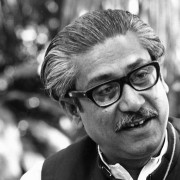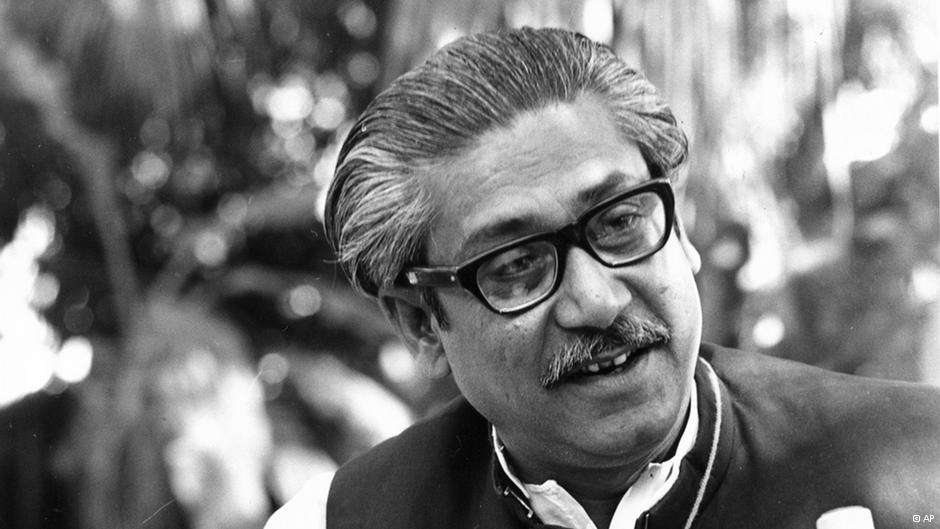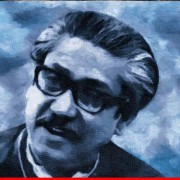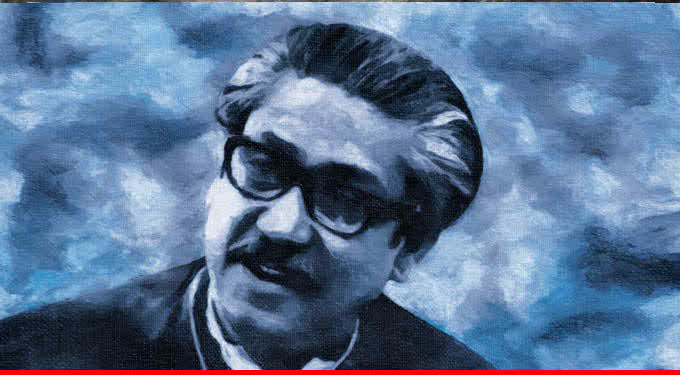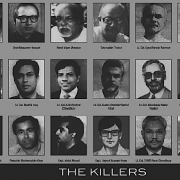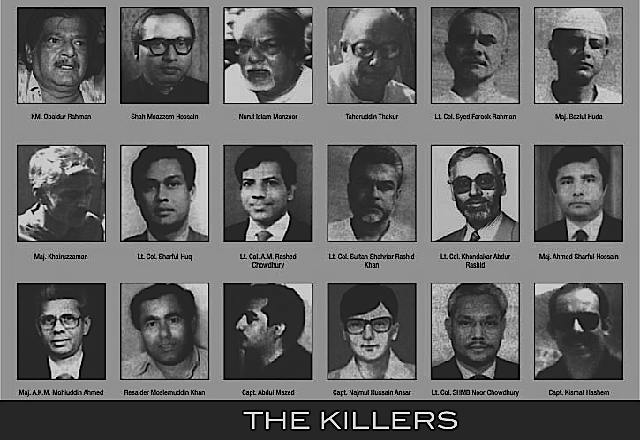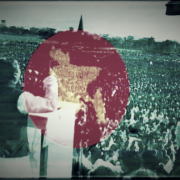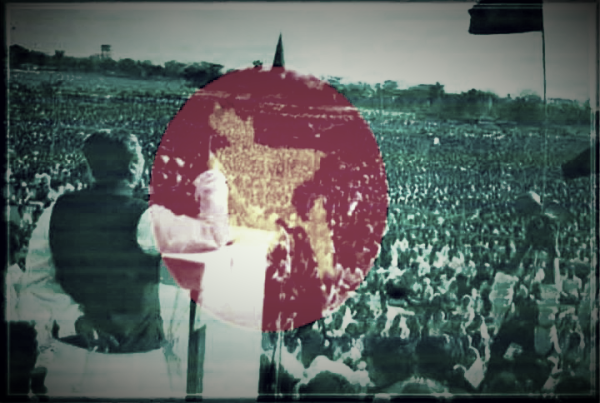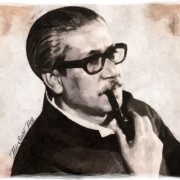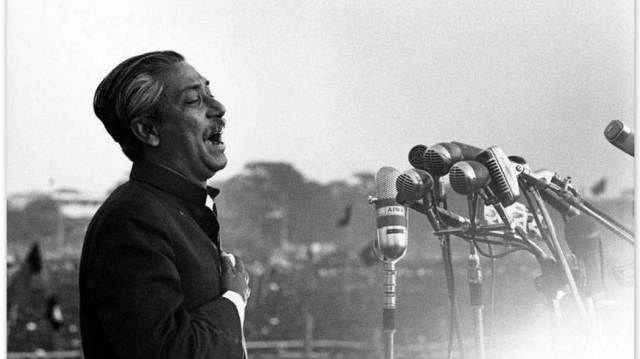
The reactionary forces who captured the state power immediately after Bangabandhu’s demise rightly understood that the deceased Mujib is more powerful as the deep rooted image of Bangabandhu cannot be wiped out from the heart of the Bengali unless an ill-designed anti-thesis against Mujib’s ideology could be introduced. So, they initiated the process of history distortion with a view to demeaning Mujib’s image.
The irony is that the major beneficiary of Bangabandhu’s killing was the valiant freedom fighter General Ziaur Rahman. In spite of being a freedom fighter, Zia did not hesitate to be a part of the blueprint of the evil forces. The reactionary forces speculated that if the new generations, who had not witnessed the war of independence, could be kept in the dark concerning the history of our liberation and the contribution of Bangabandhu, they would be successful one day. To serve this purpose, keeping Zia in front they started to distort and fabricate our war history. Not only this, the process of tarnishing the image of Bangabandhu had also begun during Zia’s regime.
Reactionary forces have brought many baseless accusations against Bangabandhu. The following paragraphs attempt to counter some of these allegations.
BAKSAL formation: Many have claimed that it was none but Bangabandhu who killed democracy and established authoritarian rule by introducing BAKSAL. On the surface, this seems to be true. But this becomes half-true if we objectively analyse the rationale behind introduction of BAKSAL. In fact, it could be argued that democracy loving Bangabandhu was bound to embrace authoritarian rule in accordance with the demand of the time. The very objective of BAKSAL was to establish socialism following Soviet model. At that time, socialism had a special appeal to the common people. If we analyse the Russian experience then it can be claimed that Soviet model was a proven model for economic emancipation. Within a short span of time the backward feudalist country Russia became one of the superpowers providing the poor with all sorts of basic needs. Besides, BAKSAL was formed in a democratic way through proper discussion in the parliament, and many people of the country, including leading intellectuals, journalists and other professional, welcomed it. However, right now, no conclusive remark on BAKSAL is possible as it died at its infantile stage.
Question of Secularism: Ideally a secular state should be indifferent to religion-religion should be the private domain of a citizen. But to Bangabandhu, secularism meant restricting the communal politics and giving equal emphasis to all religions. For this, 1972 Constitution banned religion based politics. Religion based communal politics leads to extremism and anarchism disturbing communal harmony. Analysing the consequences of activities of religion based parties worldwide we can claim that banning such politics was a pragmatic spirit of our Constitution. However, Bangabandhu defined secularism is no way anti-Islamic. We can observe that during his time, as the leader of a major Muslim country by dint of population, he was very eager to build good relationships with other Muslim countries and Bangladesh became a prominent member of OIC. Even before Bangladesh received recognition from Pakistan, he invited and received Z A Bhutto in Bangladesh just to improve the bilateral relation with the major Muslim country in the sub-continent. In this context, J. N. Dixit, who was stationed as Deputy High Commissioner of India after our independence has stated that Mujib believed Bangladesh should give priority, not just to its Bengali linguistic and cultural identity, but also, to its Muslim identity. So defining Bangabandhu’s secularism as atheism is mere propaganda.
Declaration of independence: This debate was initiated during Zia’s regime. The context of our liberation had not been created in a day. Rather it had a long history starting from the Language Movement in 1952. It was not that one fine morning in March 1971, an unknown major (Zia was then a mere major in the East Bengal Regiment!) declared independence and people started the war. The fact is, prior to our liberation war, for about half a decade under the magical leadership of Bangabandhu, people were fully motivated to be emancipated from Pakistani colonial regime.
Historical evidences suggest that Zia did not announce it first. On March 27, 1971 Major Zia transmitted a declaration of war on behalf of Sheikh Mujib. But prior to this, shortly after midnight, on March 26, Bangabandhu reportedly sent this message to East Pakistan Radio:”This may be my last message. From today, Bangladesh is independent. I call upon the people of Bangladesh wherever you might be and with whatever you have, to resist the army of occupation to the last. Your fight must go on until the last soldier of the Pakistan occupation army is expelled from the soil of Bangladesh and final victory is achieved.”
Moreover, the proclamation of independence of the provisional government also confirmed Bangabandhu’s declaration.
The historic March 7 address of Bangabandhu can also be treated as a declaration of independence. However, the recent historical verdict of the apex court, perhaps has resolved the issue.
Rakkhi Bahini issue: The objective of formation of Rakkhi Bahini was to support both the army and police forces to maintain some semblance of law and order in the war-ravaged country. After independence, some leftist extremists inspired by the Naxalite movement were engaged in various underground activities including killing, which, in turn led to total collapse of law and order of the country. Besides, the defeated “Islamic political fanatics” went underground and started their destructive politics by joining other extremist groups. The law and order situation became so bad that even in broad day light these groups dared to kill their political rivals. In this context, killing of four sitting members of parliament at that time can be cited. In this critical context, Bangabandhu decided to form Rakkhi Bahini, a paramilitary force. Perhaps Bangabandhu wanted to promote freedom fighters and so most of the members of Rakkhi Bahini were recruited from freedom fighters. In addition to police forces, creation of additional forces was not unprecedented in anyway. In this context, existence of National Guard in USA and RAB in Bangladesh can be mentioned. The Rakkhi Bahini worked successfully to control the political anarchism as initiated by the extremist groups. In 1974, it successfully carried out an operation against hoarders and smugglers. However, in some cases Rakkhi Bahini committed excesses and these should have been prevented.
Submissive foreign policy: The reactionary forces recreated the anti-Indian sentiment in the mindset of the citizen and tried to portray Mujib’s foreign policy as submissive towards India. But the fact is, Bangabandhu wanted to maintain friendly relationship with India along with Russia in the context of bi-polar international political setup of that time. It may be mentioned that both Russia and India supported our war of Independence while USA supported Pakistan. So, after independence, it was nothing wrong to keep close tie with these two friendly countries. But Mujib’s government in anyway, was not submissive towards India. In support of this assertion we may point out the fact that within the shortest time of Mujib’s return from Pakistan jail, he could successfully compel the Indian government to take back their armed forces who fought side by side with our freedom fighters. On the bilateral relationship between India and Bangladesh, the observation of Dixit was, “… even though Sheikh Mujib knew that during those early days of Bangladesh’s existence the country needed India’s assistance, he did not wish Bangladesh to become dependant on its large neighbouring giant, India, who could unduly influence its politics. For this reason Sheikh Mujib wanted the Indian “connection and influence’ to lessen over time.”
In conclusion, it may be stated that, although Sheikh Mujib was a great leader, he was not by any stretch of the imagination a prophet, or superhuman. As a politician too, no doubt he had some limitations. Researchers in future will hopefully unveil this using authentic history and considering the socio-economic and political context of that time, both nationally and internationally. But distortion of history with a view to tarnishing the great leader cannot be acceptable at any cost.
– ANWARUL KABIR –

